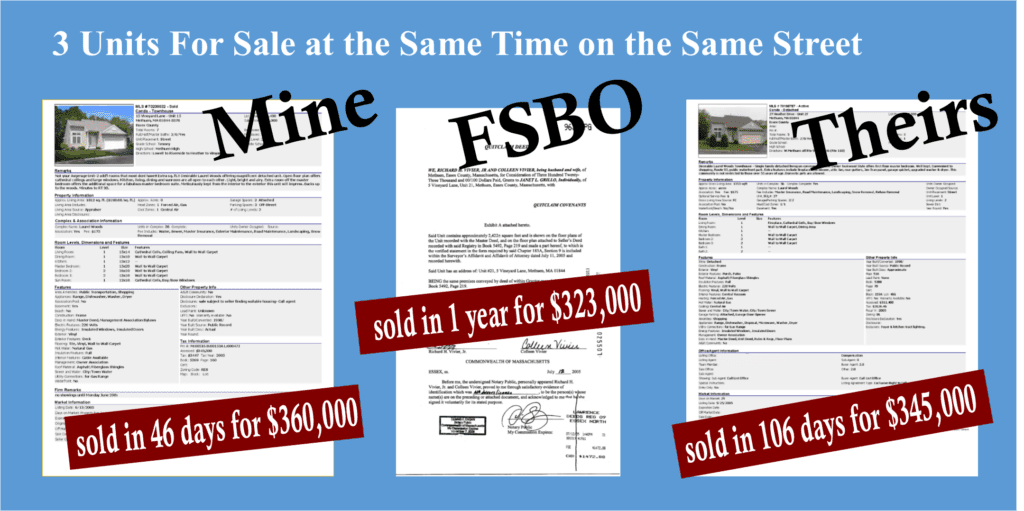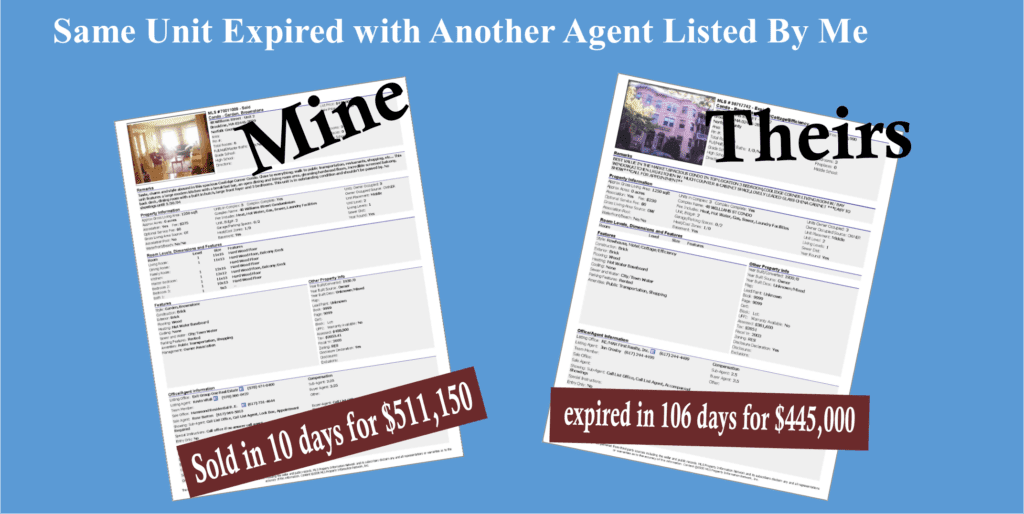Home » Kevin Vitali Massachusetts REALTORS-Real Estate Blog » Home Selling Advice » What Do You Charge for A Real Estate Commission- The Penny Wise Pound Foolish Home Seller
What Do You Charge for A Real Estate Commission- The Penny Wise Pound Foolish Home Seller
 Every month, several potential home sellers call and ask, “What do you charge for a real estate commission?”
Every month, several potential home sellers call and ask, “What do you charge for a real estate commission?”
Not, I would like to discuss the services you provide to list my home, what experience do you have, etc…..
So what you are saying as a home seller when you ask “what do you charge for a real estate commission?” You are in reality saying that you want to net the most proceeds out of the sale of your home. Of course, who doesn’t!!
What I want to do with this article is show you that a lower real estate commission does not translate to more money in your pocket.
It can even lead to fewer proceeds or, even worse, no proceeds.
Remember the adage you get what you pay for. And nothing can be more true when it comes time to cut real estate commissions.
Jump To A Section....
What Is A Real Estate Commission?
A real estate commission is a fee paid to a real estate agent or REALTOR for their services when selling your home. This commission is typically a percentage of the property’s sale price and is usually shared between the seller’s agent and the buyer’s agent. It’s the primary way that real estate agents earn money for their work since they generally don’t receive a salary or hourly wage.
Here’s How Commissions Work:
Agreement: When a property owner decides to sell their home, they’ll often hire a real estate agent or broker. The terms of the agent’s compensation are outlined in the listing agreement, including the commission rate.
Percentage-Based Commission: The commission is usually calculated as a percentage of the sale price of the home. In the United States, for example, the standard real estate commission is typically around 4% to 6% of the property’s selling price, though this can vary based on local custom and the specific agreement between the seller and their agent.
Splitting the Commission: If both buyer and seller have agents, the commission is typically split between them. For example, on a 6% commission, each agent might receive 3%. However, the split can vary; it might be 50/50, or another ratio agreed upon by the seller and agent.
Payment at Closing: Commissions are paid at the closing of the sale. The seller usually pays the commission to the listing broker, who then splits it with the buyer’s agent’s broker.
Further Division: The brokers then pay their agents. Agents are often not employees of the broker, so they don’t get a traditional salary. The commission they earn on each sale is often their primary source of income, and from that, they need to cover their own expenses, including marketing costs, association fees, and more.
It’s important to note that all real estate commissions are negotiable. The percentage or fee is not set by law and can vary depending on a variety of factors including location, the individual agent, and the specifics of the property and sale.
When You Ask “What Do You Charge for a Real Estate Commission?”
Making your decision on which real estate agent to hire based solely on what an agent charges for their real estate commission is penny-wise and pound-foolish.
Let’s take a look at three stand-alone condominiums in Methuen MA for sale on the same street, in the same complex, at the same time. Realistically, these units were almost identical and should have sold within thousands of each other.
There could not be a better real-life example of why a lower real estate commission does not necessarily lead to higher net profits.
The illustration below shows the listing sheets of two units that were in the MLS and the deed of the for sale by owner.

Which Real Estate Agent Would You Hire? The One Who Charged The Lowest Real Estate Commission or The One Who Netted You The Most Profit
Let’s look at the dollar and cents here.
Take my listing. Say I charged 6% for a listing commission. Compare it to “their” listing. Let’s assume they set 4%.
My Listing at a 6% commission ($21,600) with a sale price of $360,000 the seller netted $338,400.00
Their listing at a 4% commission ($13,800) with a sale price of $345,000 the seller netted $331,200.00
The higher sales commission netted the seller $7200 more and that is paying AN EXTRA 2% in real estate commission!!
What could you do with an extra $7200k in your pocket?
Now take the ‘FSBO”, which has a 0% commission. The seller paid nothing in real estate commissions and netted $323,000. The For Sale By Owner lost between $8,200 to a $22,600 in net proceeds depending on whether you pay a real estate commission of 4, 5 or 6%. Would you rather pay less commission or net more money in your pocket?
Note: For Sale By Owners, nationally FSBO homes sell for 13% less than homes listed with a real estate agent.
When A Home Goes Unsold Does A Low REALTOR Commission Matter?

Here is another example of why first asking, ” What do you charge for a real estate commission?” is not in your best interest when listing your home for sale.
The above listing was listed with another agent for almost four months. No results in a strong market. I listed it and went way over asking immediately and was put under agreement in 10 days.
I shouldn’t have to do the math here.
Without going into great detail, the difference is about how the home is marketed.
Marketing starts with great real estate photos. They only had one! Is your listing agent a list and pray agent, or do they have a well-defined marketing plan?
Does it matter what you pay for a REALTOR commission (within reason of course) if it’s the difference between getting your house sold or not?
What Should You Focus On Rather Than the Real Estate Fee or Rate?
First, I highly recommend interviewing 3 or 4 agents. I will highlight four things to pay attention to when interviewing an agent. These are not the only four things to consider when hiring an agent but some of the more essential points.
Of course, Every seller wants to sell their home fast and for top dollar, but worrying about the real estate commission first is the wrong way of hiring an agent.
Honesty-
Don’t hire a yes man for a real estate agent; there are plenty of them. A yes man will tell you what you want to hear. They are adept at listening to what you want to hear and giving it to you. They aim to get you to sign the contract, and they will deal with everything later.
As a listing agent, I must tell you the cold, hard facts and not sugarcoat it. You are contracting with me to do a job: sell your home for the most money, in the least amount of time, and the least hassle.
You did not hire me to be your friend and agree with every decision you made about your home. Or compliment your highly personalized decor, or tell you no, you don’t have to repair your roof.
I will not ignore your 200-piece snow baby collection in the foyer, the Fucsia accent wall in the family room, or say that the price you want that is 100k over fair market value is attainable.
I will nicely show you how and why we need to re-adjust a few things to obtain the best price for you.
What you need from me is a plan that works and for me to help you execute the plan and that starts with honesty.
Marketing Plan-
A top-notch listing agent will have a cohesive and comprehensive marketing plan they will review with you. They will talk about preparing your home, guide you on how to price your home properly, take professional photographs of your home, and leverage the internet to find potential home buyers.
An agent who charges a larger commission usually pays for more marketing. Note that the homes sold for the most money above also sold quickly. That is because a real estate marketing plan is about exposing your home to the most buyers. And not just any buyer, but the right buyers.
I use professional home stagers and photographers to prepare your house for the market. Thousand and thousands of dollars are spent on the internet every year. Does it cost me more? Yes. But it nets you more money.
More marketing equals more exposure, which equals offers!
Experience-
I hate to say it, but experience matters regarding the sale of property. From listing a home, negotiating offers, knowing how to counsel a client, and handling buyer requests after a home inspection, experience makes a huge difference. An experienced agent will have hundreds of transactions behind them to draw on. And each transaction can bring a unique set of challenges that an agent learns from but uses to help you in the future.
I am not talking about the number of years in the business. You can have someone 5 years in the business that has closed 100 transactions vs an agent 20 years in the business that closed less than a 100. Experience comes with the real estate transactions closed.
Also, hire a full-time agent and not a part-time agent to list your home. A part-time agent will not have the experience nor the time to get your home sold.
Data-
I have found a good listing agent is about providing you with data to make good decisions. They will give you data about how the market is doing, why they are suggesting a certain price on your home with the preparation of a Comparative Market Analysis, and more.
They need to do more than tell you…. they need to show you. And it needs to be communicated in a manner you understand. Ultimately, the decision is yours based on the information you have received. Be wary of an agent that just tells you without backing it up with data.
What Should I Pay For A Real Estate Commission In Massachusetts?
Real estate commission rates in Massachusetts, like in most U.S. states, can vary widely and are not fixed or regulated by any state laws. They’re often determined by the real estate agent or broker and the services provided. However, there are general trends and customary rates that can provide a guideline for what you might expect to pay.
In 2022 the average real estate commission in the United States was 5.37%. In Massachusetts, you can expect to pay a REALTOR commission of 4% to 6% and sometimes even less.
What to consider:
Comparison: Consider interviewing multiple agents and asking about their commission rates, as well as the services they provide. This will not only give you an understanding of the average cost but also allow you to compare value for money. Make sure you are comparing experience and services.
Service Level: Some agents or brokers might offer different tiers of service for different commission rates. For instance, an agent might charge a higher commission for a comprehensive service package that includes staging, professional photography, and extensive marketing, while another might charge less for more basic services.
Market Trends: In highly competitive markets, some agents may be willing to negotiate a lower commission to secure your business, while in slower markets, they might insist on standard rates.
Alternative Models: Be aware of alternative brokerage models, such as flat-fee services or discount brokers, which may offer to perform real estate services at a lower cost. However, ensure you understand what services are included in these models, as they may offer more limited support than traditional agents.
Remember, the cheapest commission rate is not always the best. You’ll want an agent who is committed, experienced, and capable of selling your home efficiently and effectively, so consider their track record, marketing plan, and the value they’ll bring to the transaction, not just their commission rate.
Negotiating A Real Estate Commission
Negotiating a real estate commission is a key part of the process when you’re selling or buying a home, and it can save you a significant amount of money. Here’s how you can approach this:
Do Your Research:
Before you begin negotiations, understand the typical commission rates in your area. Having a baseline will help you know what’s reasonable and what’s not.
Understand What’s Included:
Know what services are included in the commission. The commission might be justified if an agent charges a higher rate but provides extensive services that could expedite the sale or increase the sale price.
Interview Multiple Agents:
Talk to several real estate agents. This will not only help you understand the going rate but could also provide leverage in your negotiations. If one agent knows you’re considering others, they might be more willing to negotiate their rate.
Ask About Different Service Levels:
Some agents offer different service levels for different commission rates. Ask if they have a more basic service level for a lower commission if you don’t think you’ll need every service offered in the standard package.
Consider the Agent’s Experience and Record:
More experienced agents with a track record of quick sales or sales above the asking price might be worth a higher commission. They may be able to negotiate better deals, have a ready network of potential buyers, or provide valuable insights to expedite the sale.
Negotiate the Contract Terms:
Sometimes, negotiations can include more than just the commission rate. You might be able to adjust the length of the contract, the responsibilities of each party, or other terms that could be beneficial.
Be Ready to Walk Away:
If an agent is unwilling to negotiate at all, and you know others with the level of experience and service available at more competitive rates, be ready to walk away.
Always remember, the aim is to reach a win-win agreement where both parties feel they’re getting fair value. Effective negotiation is about more than just getting the lowest possible rate; it’s about ensuring you’re happy with the value of the service you’re receiving. You also don’t want to beat up your agent so severely that they don’t feel treated fairly.
For many real estate agents, when a seller negotiates a lower commission rate, the agent will counter by offering fewer services. And, those services you are giving up usually revolve around marketing. You must evaluate if those services you are giving up is worth paying a lower commission.
Common FAQs About Real Estate Commissions and Fees
How much will I pay for a real estate commission?
This is the most common question as most real estate commissions are based on a percentage of the sale price of the property. While commissions can vary greatly from agent to agent and region to region, a Massachusetts home seller can be offered a commisson rate of 4-6%.
Are Real Estate Commissions Negotiable?
Yes commission rates are negotiable. When negotiating commissions realize you may be giving up services.
How is your commission split between the selling agent and the list agent?
The total real estate commission you are charged is typically split between the listing agent and selling agent. A typical spit would be 50/50.
Are their additional fees above the commission to sell a home?
While the real estate commission is the largest cost associated with selling a home, there are other fees associated with the sale. Ask your agent to prepare a net sheet spelling out the costs and what you will approximately net from the sale.
Do I pay a commission if my home is not sold?
Real Estate commissions are usually contingent on the home selling. If the home does not sell, you will not pay a commission.
Final Thoughts On “What Do You Charge for A Real Estate Commission?”
I want to start off by saying that there is no set commission a real estate agent will charge to list your home. And, yes, real estate commissions can be negotiable. You have every right to be concerned about the commission you pay.
As you can see from the example above, paying the lowest real estate commission does not necessarily mean you will make the most amount of money on the sale of your home. Make the decision now: will you hire an agent based on their marketing plan and experience or the commission they charge?
Not to say, with all things being equal between agents, you shouldn’t consider the commission. But to unilaterally hire an agent because they had the lowest real estate commission will lead to disappointment. And a lot of sellers do!
Don’t be a penny-wise and pound-foolish home seller. If you want to net the most money for your home, there are more important aspects to consider than what you pay for a real estate commission.
Other Listing Agent Resources:
- US News- Hiring the right listing agent is more important than what you pay for a commission. Discover 9 Mistakes When Hiring a Listing Agent
- Anita Clark- Why You Should Hire A Listing Agent to Sell Your Home
- Bill Gassett- Sometimes, it doesn’t work out with your listing agent. Find out how and When to Fire Your Listing Agent
- Paul Sian- What to look for when choosing an agent to list your home. Learn important Tips for Choosing the Right Listing Agent
- Xavier DeBuck- Why Do Agents Knowingly Take Overpriced Listings

Author Bio
Kevin Vitali is a Massachusetts REALTOR out of Haverhill MA that serves Essex County and Northern Middlesex County in Massachusetts. If you want to buy or sell a home, let me use my years of experience to get you the best possible outcome.
Feel free to contact me to discuss any upcoming moves. I am always happy to answer your questions
Call 978-360-0422 Email kevin@kevinvitali.com




